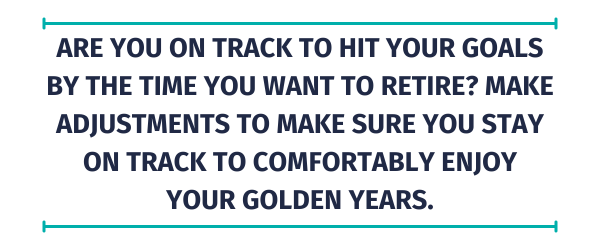
8 Reliable Tips to Weed Out Bad Financial Habits
04/18/2024
Even if you don't have a green thumb, you probably know that weeds are bad for gardens; they'll halt the growth of your vegetables. Poor decisions like overgrown debt, forgotten expenses, and poor budgeting can also halt your financial growth! Spring isn't just a time to enjoy the sun and grow greenery; it's important to rip out those financial weeds that are starting to sprout up and impact your finances.
You don't need to break out gloves or dig through the dirt; you just need to make actionable plans and brush up on your financial literacy! It's time to update your financial strategies, but where should you start?

#1: Refine Your Budget
The foundation of any strong financial refresh will always start with your budget. We talk about budgeting a lot, but for a very good reason: it's an important foundation for your financial success. Knowing exactly where your money goes every month is the first step to ensuring you aren't wasting funds that would be better suited elsewhere. Break out the magnifying glass and take a closer look at your monthly spending habits. Where are you overspending, and where can you cut back? Are you spending too much on takeout? It's time to visit the grocery store. Small changes can make a drastic difference!
Want more budgeting tips? Our Blog – The New Year Is the Best Time to Upgrade Your Finances can walk you through the process of building or refining your budget.
#2: Prune Your Expenses
How many subscription services are you paying for a month? Do you even know? It's time to take stock of your subscription services, memberships, and other recurring costs. There might be some you pay for that you rarely use, in which case it's time to say goodbye. Make the most out of the money you DO spend and prune the services and memberships you don't use enough. Every little bit counts, and reducing your recurring expenses allows you to adjust your budget and spending power.
Need a little more help on how to weed out those pesky subscription services? Check out our blog – Are You Wasting Money? Quit Subscription Services You Don't Need!
#3: Reduce Your Debt
You're almost an anomaly if you live in America and have no debt. Reducing the weight of your debt can make a massive difference in your financial situation. How long has it been since you secured your loan? If your credit score is better, then refinancing the loan could reduce your interest rates.
Another step you can take to reduce your debt is to apply for a debt consolidation loan. It'll allow you to make one monthly payment at a potentially reduced rate instead of juggling multiple bills. Consolidating or refinancing your loan can help you save money, improve your credit, and speed up your financial recovery.
#4: Assess Your Savings Strategy
It’s time for that savings check-in. So, how are you doing? Is it time to update your strategy? Review your savings goals and assess if your current methods are working. Make adjustments as necessary to determine if you also need to make changes to your goals. If you’re saving toward a necessary purchase, such as a new car, you might need to put aside more money for your savings.
Another important thing to consider is where to put your savings, and no, under your mattress doesn’t count. Put the money you’ve earmarked for your savings each month into a high-yield savings account so that your savings continue to generate dividends. A money market account works fantastic for large sums. If you don’t plan on using your savings fund for a while, consider putting it into a certificate to mature over a set amount of time.

#5: Review Your Retirement Progress
Planning for the future is easy, and you’ll never regret it. Let’s return to the garden analogy for a minute; without constantly maintaining the plot, the plants will wither and die, but if you give them love and attention, they’ll prosper and fruit. The same can be said for your retirement strategy. If you maintain it and continuously contribute, you’ll eventually get to enjoy the rewards of all your labor. Are you on track to hit your goals by the time you want to retire? Make adjustments to make sure you stay on track to comfortably enjoy your golden years.

#6: Invest, Invest, Invest
Do you have funds invested in the stock market? Are your investments aligned with your long-term financial goals? Is your risk tolerance too high or too low? Review your investment strategy thoroughly with your financial advisor and make any necessary changes to optimize your portfolio and maximize returns.
Putting money aside each month to invest safely can create future boons, but it's important to approach investing with a strong understanding of the volatility inherent to the market. You can create a risk factor strategy, but there will always be more risk involved in investing your money than setting it aside in a high-yield savings account.

#7: Is Your Insurance Doing Enough to Protect You?
Don’t forget to review your insurance policies; it’s the perfect time to make sure that your life is adequately covered. You should always include your home, auto, health, and life insurance in your financial decisions; they’re necessary protections that can help you in times of emergencies.
Identify gaps or areas where you may be overpaying for coverage you don’t need. Are you looking to make changes to your insurance or just get an insurance review? You can get a no obligation quote from the Atlantic Insurance team who will help you shop around for what best fits your needs.
#8: Evaluate Your Emergency Fund
Putting together an emergency fund can be a life saver when you need to cover unexpected expenses or financial setbacks. Take time to evaluate your emergency fund, is there enough money set aside to protect you in the case of a crisis?
If your funding falls short, prioritize building it up by reallocating your budget to set aside some extra money each month until you reach your goal. Consider automating your savings to ensure consistent progress.
Need more help building an emergency fund? Check out our blog, Be Prepared, Not Scared: The Power of an Emergency Fund.
We’re Here to Help!
Every few months, you should brush up on your finances to review your current situation and assess any important changes you should make. What better time than spring? Everything from loans and savings strategies to insurance policies and emergency funds provides opportunities to improve your well-being. It’s an ever-evolving process that requires work but can set you up with a financially secure future.
If you want to learn more about consolidating high-interest debt or boosting your savings yields, we’re ready to help. Please stop by any of our convenient branch locations or call 800-834-0432 to speak with a team member today.
Stay up to date and join our email list.
The Atlantic blog strives to deliver informative, relevant, and sometimes fun financial information. If you enjoyed this article, please forward it to a friend.
Each individual’s financial situation is unique, and readers are encouraged to contact the Credit Union when seeking financial advice on the products and services discussed. This article is for educational purposes only; the authors assume no legal responsibility for the completeness or accuracy of the contents.

